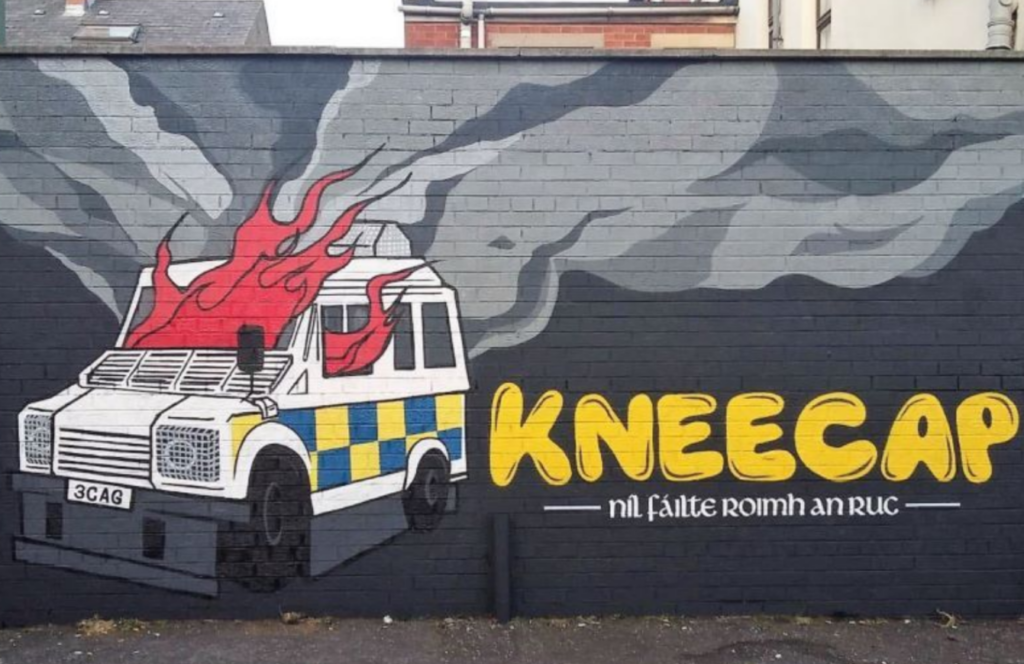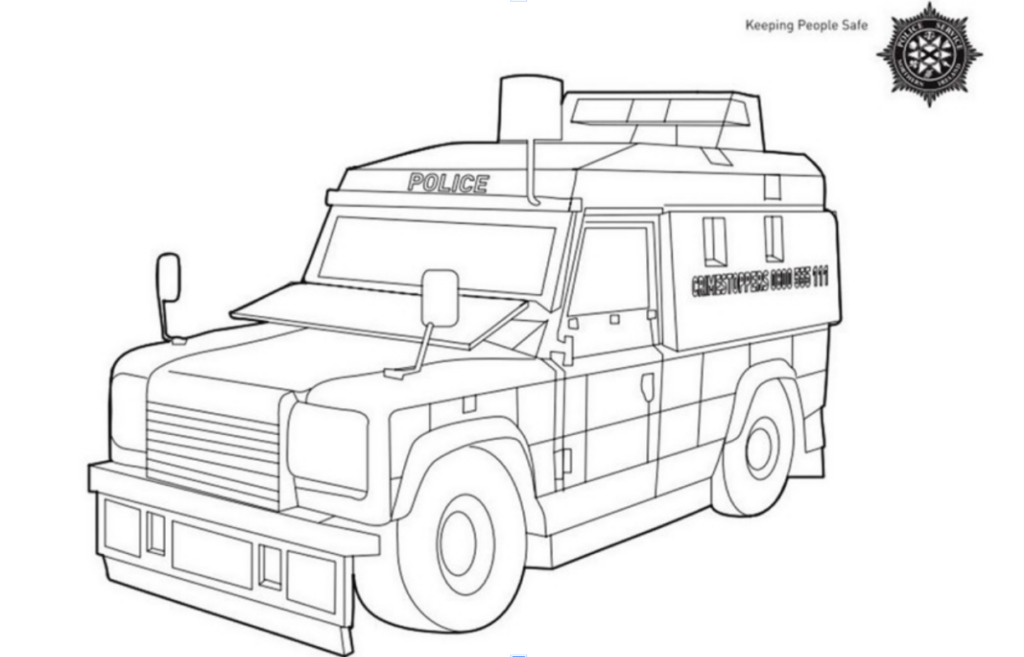‘[…] as a community we need to start asking ourselves what messages we’re sending out about the kind of future we want. Normalising/excusing violence, seeking to cause hurt/offence, isn’t how to build a better future for us all.
Naomi Long
During my time as part of the Visualising Peace project, I have come to realise that there is a lot of cross-over between the search for peace, conflict and activism. In Northern Ireland in particular, the line between activism and antagonism is thin, the fragile border varying from individual to individual. In this entry, I will examine the role of the controversial Belfast-based rap trio ‘Kneecap’, and their participation in the West Belfast music festival Féile an Phobail (The Peoples’ Festival) 2022.
Despite engaging in what many consider to be provocative behaviour, Kneecap conceptualise themselves as activists rather than dissidents. However, the aim of their activism must be carefully considered. How and where do we draw the line between activism and antagonism and what does Kneecap’s participation in Féile mean for the festival’s power as a self-defined peacebuilding mission?
‘Just art’… or activism, or antagonism?
On the 12th of August 2022, Kneecap unveiled a mural depicting a burning PSNI (Police Service of Northern Ireland) van in the traditionally Catholic Nationalist Hawthorn Street in West Belfast. The slogan ‘Níl fáilte roimh an RUC’ (The RUC are not welcome), painted in Irish below the burning vehicle, references Kneecap’s Irish-language song ‘C.E.A.R.T.A’ (‘R.I.G.H.T.S’).

However, the mural’s slogan and imagery have strong anti-establishment and political connotations, for example implying that the post-Good Friday Agreement (GFA) PSNI is still, in essence, the RUC (Royal Ulster Constabulary), the pre-GFA police force accused of unjust treatment of Catholic Nationalists during the Troubles. As such, the mural was met with outrage. Leader of the centrist Alliance Party Naomi Long commented:
‘The band in question court controversy – it’s publicity and I doubt this latest mural will do them any harm. However, the same can’t be said of young children being groomed into sectarian hatred. […] We’ve seen this all summer: it needs to stop. We owe the next generation better. Loathe to give the band more publicity, but as a community we need to start asking ourselves what messages we’re sending out about the kind of future we want. Normalising/excusing violence, seeking to cause hurt/offence, isn’t how to build a better future for us all.’
Graham Cousins, “Irish language group Kneecap accused of ‘grooming sectarian hatred’ with Féile mural,” News Letter, August 14, 2022, https://www.newsletter.co.uk/news/national/irish-language-group-kneecap-accused-of-grooming- sectarian-hatred-with-feile-mural-3805341.
In another of my museum entries, I examined how the Wolfe Tones, a long-standing institution of traditional music in the Republic of Ireland respond to ideological criticism, and I believe that parallels can be drawn between their approach and how Kneecap handle similar comments. Much like the Wolfe Tones, Kneecap endeavour to distance their actions from dissident activities. In an interview with the Guardian, Móglaí Bap says, “We’re not an army. We’re just three boys from Belfast making a bit of art’. In the same article, when asked about the controversial mural, Móglaí asserts the band’s presence in the space of activism claiming, ‘We don’t want to be fighting or advocating violence. We want people to be thinking.’ However, in this interview, he does not clearly state the effect the band hopes their activism will have.

The Wolfe Tones explained the public’s negative reaction to their performances as a lack of understanding of the music’s lyrical content, shifting the responsibility for causing offence from themselves as songwriters onto those who were offended by it. Kneecap’s Mo Chara does something similar in this interview with the Guardian, moving the responsibility for the offence caused by the band’s mural from the trio themselves and once again onto those who were offended by it. He also implicates the PSNI, saying:
‘It was just confusing more than anything,” says Mo Chara now. “I looked at the fucking thing a million times, thinking, ‘How is this in any way sectarian?’ We took the design from a PSNI colouring book sent out to schools because they had such poor support from young people in the community.’
Brian Coney, “’We’re not an army-we’re three boys from Belfast’: rap crew Kneecap laugh off their week of controversy,” The Guardian, August 19, 2022, https://www.theguardian.com/music/2022/aug/19/rap-kneecap-belfast-interview.
While it may be true that Kneecap see themselves as an activist group, it could be argued that the band uses rhetorical tactics similar to those of the Wolfe Tones to legitimise what have proven to be highly provocative actions. And as is clear from both example, while activism is an integral part in the process of achieving peace, the fine line between activism and antagonism can easily become blurred.
Féile, meaning ‘festival’, is a community arts programme based in West Belfast which organises cultural events throughout the year. The August ‘Flagship Festival’ in particular is conceptualised by Féile as an agent of peacebuilding in Northern Ireland, and was founded in 1988 as ‘a direct response to the conflict in the north of Ireland,’ providing an alternative to violent altercations around the anniversary of the beginning of internment in Northern Ireland in early August, 1971. Féile defines its aim as showcasing ‘the positives of west Belfast and the incredible talent and creativity that comes from that’. However, the controversial status of some of its bands and acts calls Féile’s peaceful ethos into question.
Aside from the tensions created by the revelation of Kneecap’s mural in the run up to the festival, the band’s performance of their song ‘Get Your Brits Out’ to a crowd of Irish-tricolour-waving young adults and teenagers, who sang along enthusiastically, might undermine peaceful Féile’s mission. The lack of unionist symbols like the Union Jack suggests that the audience was primarily composed of Catholic Nationalists, doing little to create inter-sectional collaboration and possibly strengthening the Nationalist enclave in West Belfast. While the song ‘Get Your Brits Out’ describes a night out gone wrong with some of the DUP’s most influential figures, strengthening Kneecap’s position as a group of activists by offering a critique of homophobia in the party, the political and sectarian undertones of the chorus ‘Get Your Brits Out’ cannot be overlooked.
Kneecap’s performance at Féile offers an interesting perspective on how peace is visualised, promoted and challenged within nationalist circles in Northern Ireland and the fine line between activism and antagonism. Kneecap’s use of activist rhetoric helps to legitimise their activities, allowing them to engage in potentially inflammatory behaviour, while escaping the brand of ‘dissident’. Their performance at Féile calls the peacebuilding intentions and power of the festival itself into question, since – whether intentionally or not – the festival provides a platform for what could be viewed as a disguised nationalist agenda. Due to this, it could be suggested that activism is being weaponised in Northern Ireland, disguising and legitimising political agendas.
What do you think?
- Where do you think the line is between activism and antagonism?
- Do festivals and other media outlets have a responsibility to consider peace processes when they are booking their talent?
- How might Kneecap ‘rap their truth’, maintaining free speech but in a more peaceful way?
- Is it OK for art to offend the public? When might this require intervention?
If you liked this item in our museum…
You might also enjoy The Wolfe Tones, Cambridge Union Debate, Is hacktivism peaceful?, Beach Party Vietnam and Intergalactic Freedom Dress.
Aimée Capraro, April 2023
References
- Ó hÍr, Liam and Louis Strange, “Tiocfaidh Ár Lá, get the Brits out lad: Masculinity and nationalism in Irish-language rap videos”, Social Semiotics 31, no. 3 (2021): 466-488. Full article: Tiocfaidh Ár Lá, get the brits out, lad: masculinity and nationalism in Irish-language rap videos (tandfonline.com)
- “About/Fuinn,” Féile an Phobail., https://feilebelfast.com/about/
- Féile an Phobail director 2022, Kevin Gamble, quoted in: Claire Simpson, “Imelda May, Paul Brady and Damien Dempsey to headline Féile,” The Irish News, July 1, 2022, https://www.irishnews.com/news/northernirelandnews/2022/07/01/news/imelda-may-paul-brady-and-damien-dempsey-to-headline-fe-ile-2760382/.